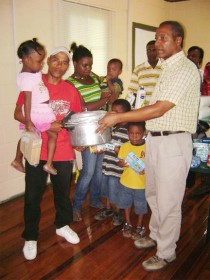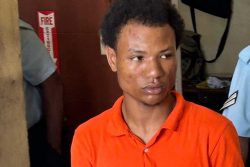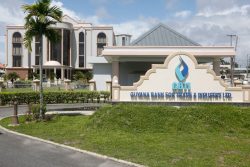History was created in Linden when five families from sections of Linden lost their homes and all contents to fire over a two-week period leaving residents puzzled. In two of the cases, children under the age of ten years were at home alone, while the other three occurred while no one was at home.
Hardest hit was the rapidly developing community of Block 22, while the others occurred in Wismar Housing Scheme and Christianburg. Three of the incidents were believed to have been electrical in nature; one was suspected to be arson, while the cause of the most recent one, at Christianburg on Saturday night is unknown.
Last Friday, two of the families received much needed assistance from the recently formed Linden Food for the Poor Committee. At the receiving end were Jennifer Almon and her daughters Vanessa and Volieta and Ken-E and Oneeka Williams and their four children Zechariah seven years, Ken-E Jr four years, Kellyann three years and Abdul two years.
A team of officials from the Food for the Poor head office was in Linden on Friday to hand over the items to the Linden arm which then made the donation to the family. Among the items donated were foodstuff, goodies, clothing, kitchen utensils, footwear and cleaning agents. The quantity of stuff received by each family valued in excess of $100,000.

Preparations are in train for similar relief packages to be handed over to the other three families who lost their homes after Friday’s donation. Managing Director of Food for the Poor Guyana Inc Leon Davis was keen on noting that his organisation is not a relief organisation but is always committed to giving assistance whenever and wherever it is needed.
In addition to its taking the assistance packages to Linden on Friday the head team of the organisation was in the town for an orientation session with its recently formed Linden arm.
The two groups will be working to realize a housing programme for the poorest of the poor in the mining town, as well as agricultural, feeding and skills building programmes. These would be done parallel to the regular distribution of food and other items to the general public.






